“I would argue that your shoes are more important than most things in your home gym,” says BarBend expert reviewer Amanda Capritto, CPT, CES, CNC, CF-L1, CSNC. With this in mind, you may be sprinting to our list of the best cross-training shoes. However, what you wear outside of the gym is just as important for performance, and the best recovery shoes can help you bounce back from each strenuous workout with refreshing comfort, supportive arch support, and uncomplicated measures to get into and out of the profiles.
We understand that “recovery footwear” may be unknown to most — many brands have just begun to design silhouettes targeting this niche category. So, to give you a leg up on maximizing your downtime between training sessions, we’ve slipped into multiple top-rated kicks and consulted with our in-house team of experts to come up with our list of the best recovery shoes available today.
The 9 Best Recovery Shoes of 2026
- Best Recovery Shoes Overall: Kane Revive Active Recovery Shoes
- Best Budget Recovery Shoes: Adidas Adissage Slides
- Most Versatile Recovery Shoes: Under Armour UA SlipSpeed
- Best Recovery Shoes for Around the House: Teva ReEMBER
- Best Slip-On Recovery Shoes: HOKA Ora Recovery Shoe 2
- Best Shoes for Recovery Runs: Asics Gel-Nimbus 26
- Best Recovery Sandal: OOFOS OOahh Slide Sandal
- Best Recovery Shoes for Plantar Fasciitis: Vionic Rejuvenate Recovery Sandal
- Most Comfortable Recovery Shoes: Topo Athletic Revive
How We Tested and Chose the Best Recovery Shoes
The BarBend team is made up of competitive athletes, certified personal trainers, and lifelong fitness enthusiasts. To make our list of the best recovery shoes, we got hands-on with 15 different shoe profiles from top brands, using a multi-point methodology to rate each profile on a scale of 1 (lowest) to 5 (highest) to determine our top picks. Below are some of the categories and components we looked at to make our list.
For further information on how we trial and test the products chosen for this guide and more, be sure to read the BarBend Equipment Testing Methodology page.
- Cushioning: One of the main factors separating recovery shoes from other footwear is the pronounced underfoot cushioning for added comfort post-training. All of the shoes featured in this guide either feature a well-cushioned midsole to keep your steps plush and a cozy footbed that isn’t harsh on your heel and forefoot.
- Durability: You don’t want to look at your pair of recovery shoes only to find that they’re worse for the wear after just a few uses. All of the picks in this round-up feature durable upper materials and resilient outsole tread patterns for sustained traction over time — provided you aren’t wearing your recovery footwear more than necessary.
- Ease of Entry: Having a convenient slip-on design can be more inviting post-workout than trying to lace up a pair of kicks with little energy left in the tank. For this curated list, we sought to favor slip-on recovery shoes over laced silhouettes, as they’re naturally an easier form of footwear to get into and out of.
- Arch Support: When your feet are tired, you’re likely to showcase a less-refined walking or running form, which can lead to compromised landings that may lead to pain across your arches. We made note of recovery shoes featuring a contoured footbed that could better dissipate the pressure of each step evenly across your foot, giving you a break from landing flat-footed and providing the support needed to bounce back for another crack at training.
- Price: The recovery shoe category is somewhat new, so metrics on pricing can be all over the place as more silhouettes get added to the mix. On average, though, we found that you can expect to pay roughly $90 for a high-quality pair of recovery shoes. We did our best to include picks that hover around that cost with some more specialized profiles — like shoes ideal for recovery runs — costing more.
Best Recovery Shoes Overall: Kane Revive Active Recovery Shoes
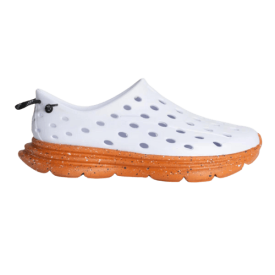
The Kane Revive Active Recovery Shoes feature a molded design that’s easy to clean and comfortable to cruise around in. The sugarcane-based EVA foam provides a soft yet responsive ride, and raised nodes along the footbed can help massage the bottom of your feet for improved circulation post-workout.
Specs
- Price: Starting at $75
- Footwear Style: Molded sneaker
- Weight: 8.9oz
- Upper Material: Sugarcane-based EVA foam
- Available Colorways: 57
- Available Sizes: 3-17
Pros
- Simple, comfortable silhouette that slips on and off easily
- EVA foam construction is easy to keep clean
- Raised footbed nodes for increased stimulation and blood flow
Cons
- Can squeak as air passes through exterior perforations
- Collar can lead to blisters with extended wear
- Silhouette may be polarizing for some tastes and preferences
The Revive Active Recovery Shoes from Kane Footwear, in our opinion, are the best examples of recovery sneakers on the market today. The molded clog style is easy to get on and off, making post-workout efforts minimal, and the raised nodes along the footbed are designed to help improve circulation. Plus, the large perforations along the upper can add some much-appreciated breathability as you cool down after your gym sessions.
I’ve had my Kanes for months now and regularly turn to them for post-workout wear. Getting into the molded sugarcane foam profile is a breeze, which can be great for convenience’s sake after training. I also rated the comfort at 5 out of 5, as the dual-density midsole construction gives you a nice sense of plush cushioning while the raised nodes work to simulate a foot massage for boosted circulation.
[Related: Post-Workout Recovery Tips From Celebrity Fitness Trainer Don Saladino]
An easy comparison to the Kane Revive would be your common pair of Crocs. However, I prefer these molded shoes over the alternative as I feel there’s more structure underfoot. I feel the Kane Revives give you a little more arch support, which can help keep your strides in a natural plane. However, I still feel the overall looks may be polarizing for some (despite the abundance of colorways), so I rated the style at a conservative 3.75 out of 5.
The breathable perforations can be great for keeping your feet cool after training, but I do want to point out that these shoes can begin to squeak during wear as air dissipates through the holes. I’ve noticed this mostly when my steps were heavy after a grueling workout — gravity sort of takes over and pushes the air out from underfoot for a whistling effect.
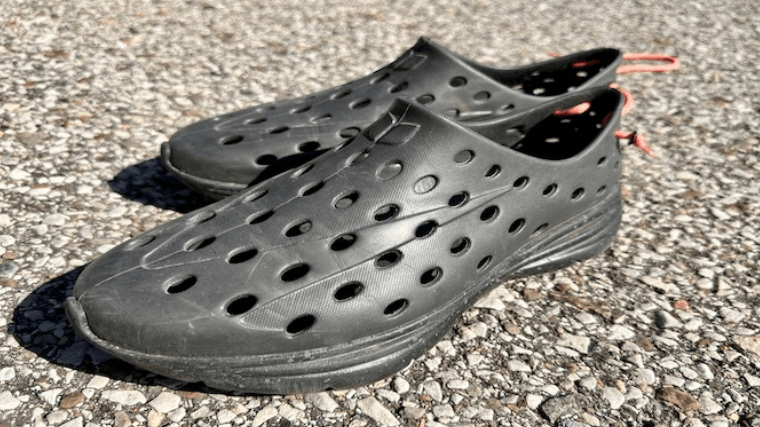
Finally, I had no issues with the fit and rated these Kanes at 4 out of 5 for the category. The brand does recommend sizing down, though, if you’re in-between sizes, so be sure to follow these instructions. Additionally, I’d recommend wearing socks for your first few wears — the more rigid collar around the opening can feel abrasive, potentially leading to blisters.
[Related: Best Running Socks]
Best Budget Recovery Shoes: Adidas Adissage Slides
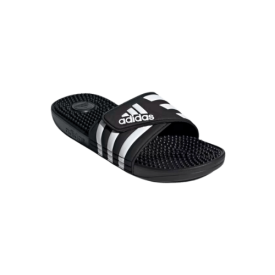
Classics in their own right, the Adidas Adissage Slides can be an effective solution for budget-friendly recovery footwear. Getting into the slides themselves takes little effort, and the iconic raised nodes across the footbed give each step a massaging sensation for added comfort.
Specs
- Price: $32
- Footwear Style: Flip-flop
- Weight: 8oz
- Upper Material: Hook-and-loop
- Available Colorways: 4
- Available Sizes: 4-18
Pros
- $32 price tag is below the $90 average for recovery footwear
- Nubbed footbed can create a soothing sensation underfoot
- Slip-in design for convenient, simple wear
Cons
- Limited traction across outsole
- Nubbed footbed can become easily packed with dirt and debris
- Not as much arch support as other recovery footwear
A pair of recovery shoes doesn’t need to be a glamorized silhouette with an unreasonable price tag, despite the uniqueness of the footwear category. For example, the Adidas Adissage Slides can be a perfect solution for post-workout wear at the low price of $32. For reference, that’s roughly a third of the average cost of other “recovery” footwear.
I’ve owned multiple pairs of these recovery slides over the years — from my times in the college dorms to tournament weekends on the baseball field and beyond — and only recently recognized them as high-quality recovery footwear.
The nubbed footbed can provide a massaging effect to your heel and forefoot during steps, which can help promote circulation to your tired feet and pair nicely with your routine of best post-workout supplements. Add in the fact that you can get three pairs of these recovery slides for the price of one standalone recovery sneaker, and I had to rate the value at 4.5 out of 5.
I also admire these Adidas slides for their foundational style notes. The three stripes across the midfoot hook-and-loop band are iconic, and I like how the open-toe design practically screams summer fun (trust me, do not wear these slides through a snowy parking lot). For these reasons, I scored the overall style at 4 out of 5.
The Adissage slides are, however, your perfect example of throwaway flip-flops. The outsole traction is rather flat, which can lead to more slips and slides than wanted. I’ve also had my fair share of clogged footbeds, which will need to be cleaned out routinely over time. I also rated the stability at 3.5 out of 5, as there’s practically zero arch support across the flat midsole outside of a few taller nubs near the midfoot.
That said, these can be a great introduction for athletes entertaining the notion of recovery footwear. While the flip-flop style isn’t for every taste, the sound of a good deal is.
[Related: Should Athletes Wear Flip Flops?]
Most Versatile Recovery Shoes: Under Armour UA SlipSpeed
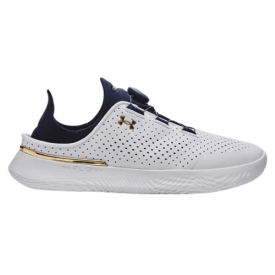
The UA SlipSpeeds from Under Armour offer a unique approach to gym-focused footwear. A BOA Fit lacing system helps you conveniently dial into that proper fit without any knots or excessive lacing, while a collapsible heel gives you the power to wear these either as a traditional sneaker or post-workout slip-on clog.
Specs
- Price: $120
- Footwear Style: Slip-on sneaker
- Weight: 10.8oz
- Upper Material: Engineered synthetic leather
- Available Colorways: 18
- Available Sizes: 3.5-18
Pros
- Collapsible heel for sneaker- or clog-style wearability
- BOA Fit lacing system provides convenient lockdown
- Wide range of colorways for added style
Cons
- Synthetic leather upper doesn’t breathe as easily as mesh
- Can experience heel slippage when worn as a traditional sneaker
- Lateral support is limited, hindering side-to-side movements
For those looking for a recovery shoe that can be worn outside of post-workout environments, we recommend the UA SlipSpeeds from Under Armour. With a heightened sense of style along with a comfortable UA FLOW midsole for helpful cushioning and responsiveness, we wouldn’t blame you if these recovery slip-ons quickly turned into a regular pick for your everyday wardrobe.
I’ve had these UA SlipSpeeds in my footwear rotation for a while now and do appreciate the fit and comfort at play across the silhouette. While Under Armour does market these SlipSpeeds as a “training shoe” I feel they’re better suited for recovery and less intense activities like walking. There’s not enough lateral support to promote a locked-in feel necessary for training like you’d find in some of the best stability running shoes, and the synthetic heel can leave room for slippage when worn as a traditional sneaker. As such, I rated the stability at 3.75 out of 5.
Still, however, I rated the versatility at 4.5 out of 5 given the wearability options presented through the collapsible heel. You can wear these slip-on shoes as either a traditional sneaker or a slip-on clog — a feature not often shared amongst the competition (unless you have a disdain for a proper heel counter). I’ll admit, too, that sliding into these sneakers and collapsing the heel is a pleasant treat after a long, grueling leg day or HIIT session.
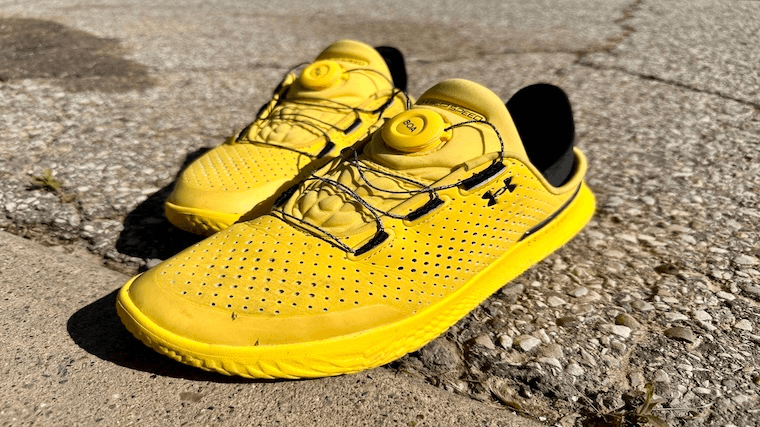
In terms of lockdown, I rated the SlipSpeeds at 4 out of 5 thanks to the BOA Fit lacing system. Rather than your traditional shoe laces, this sneaker is adjusted through a turnstile toggle that tightens or loosens thin cords across the midfoot. You can really dial in (pun intended) the fit of this sneaker. I also like how the settings remain across wears — no need to readjust every time you take off and put on the shoes.
The UA SlipSpeeds are available in 18 different colorways, so there’s no shortage of options to choose from. However, I will say that the synthetic leather upper can run hot at times — it may be best to save these for after your cool-down exercises.
Best Recovery Shoes for Around the House: Teva ReEMBER
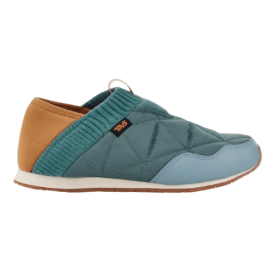
The slipper-style ReEMBERS from Teva can be a comfortable solution for in-house kicks. The plush ripstop upper resembles a quilted comforter for a nice sense of coziness over the top of your foot, while the grippy outsole can be ideal when trying to maintain balance and traction over differing flooring options like carpet, hardwood, turf, and more.
Specs
- Price: $80
- Footwear Style: Slip-on slipper/sneaker
- Weight: 8oz
- Upper Material: 100% recycled ripstop
- Available Colorways: 5
- Available Sizes: 3-12
Pros
- Comfortable slip-on fit that’s perfect for in-home wear
- Anti-odor treatment allows for wear without socks
- Rubber outsole provides great traction across carpet and hardwood alike
Cons
- Ripstop upper limits air flow across the profile
- No true presence of arch support
- Only available in five colorways
Sometimes, the key to surviving your rest days at home is just a comfortable pair of kicks. The Teva ReEMBERs feature a plush ripstop upper, synthetic heel for easy entry and exit, and a grippy rubber outsole that can keep you moving across carpet, hardwood, or anywhere else outside of the gym.
These ReEMBERs have practically become a piece of my workday uniform thanks to their unparalleled comfort. While the ripstop upper can lead to some breathability issues on hotter days, I still feel a great sense of plushness overfoot that keeps me cozy in-between workouts.
I rated the comfort at 4.5 out of 5, too, given the closed-toe design that still gives me enough room to wiggle across the toe box. After all, do you really need to have a secure, snug fit if your steps are only taking you from your home office to the kitchen and back? You can even wear the ReEMBERs without socks thanks to a convenient anti-odor treatment across the profile.
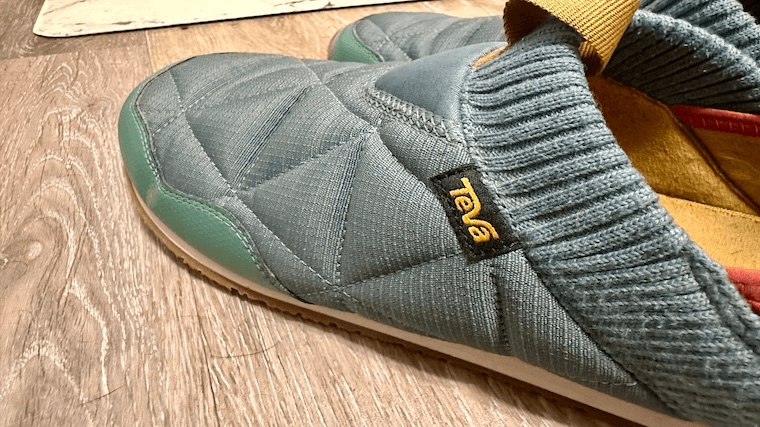
In terms of traction, I also appreciate the tread pattern across these slip-on sneakers/slippers, which I scored at 4 out of 5. The pattern is grippy enough to combat thick carpet yet still retains some security on sleek hardwood. I’ve also worn these Tevas on short jaunts outside and haven’t noticed any compromised footing.
I do reserve these mostly for in-home wear, though, given the lack of arch support across the midsole. There is some cushioning at the midfoot, but the last is predominantly flat — comfortable enough for short treks around the house, but I wouldn’t want this sensation all day.
The style of these slip-ons also lends itself to interior wear. There are only 5 colorways available, which limits how you can style these kicks that look as if a Toms slipper met up with a quilted comforter. While I enjoy the look, they may not blend as seamlessly with your normal attire as other picks in the “recovery shoe” category. As such, I rated the style at a conservative 3.75 out of 5.
Best Slip-On Recovery Shoes: HOKA Ora Recovery Shoe 2
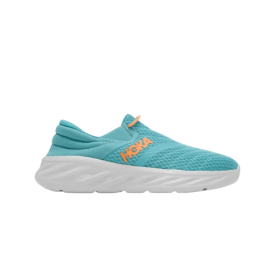
If you want a spark of convenience in your recovery shoes, the slip-in design of the HOKA Ora Recovery Shoe 2 can be a great treat post-run or post-workout. The front pull tab makes getting into these sneakers as simple and efficient as possible, while the memory foam heel cradles your Achilles nicely while still providing enough structure for supported striding.
Specs
- Price: $90
- Footwear Style: Slip-on sneaker
- Weight: 6.6oz
- Upper Material: Dynamic mesh
- Available Colorways: 4
- Available Sizes: 7-14
Pros
- Front pull tab for easier entry and exit
- Memory foam heel improves comfort with no signs of slip
- Lightweight 6.6-ounce design makes for easier pick-ups
Cons
- Mesh upper can be prone to rips over extended wear
- Less vibrant colorways than other HOKA silhouettes
- Exposed foam outsole can wear down over time
When you’re trying to come down post-run or post-training (or simply trying to lower your resting heart rate), odds are that you’re less inclined to lace up a fresh pair of sneakers. Slip-on recovery shoes can be a real treat in these instances, with the HOKA Ora Recovery Shoe 2s, in our opinion, being the best of the bunch. This profile features a flexible mesh upper, contoured memory foam heel, and convenient pull tab where the tongue would sit for a seamless transition between your cross-training shoes and post-training attire.
I’ve worn these Ora Recovery Shoe 2s in the past and do enjoy how easy it is to slide into these kicks after a workout. There’s little effort needed, and you’re greeted with a cozy upper that’s plenty breathable along with a compression-molded EVA foam midsole that’s plush enough to make you feel like you’re walking on clouds. I rated the ease of entry a perfect 5 out of 5.
The memory foam heel also pairs nicely to the sensations on foot, creating a comfortable collar that doesn’t rub excessively yet still has enough structure to prevent any unwanted slippage during strides. I wouldn’t necessarily trust these sneakers for dedicated jogging circuits, but for my trek from the gym doors to my car, they do fine enough for a 4 out of 5 rating.
Unlike other HOKA silhouettes, the Ora Recovery 2s feature a stamped outsole, meaning there isn’t any rubber present across the bottom of the sneaker. I’ve found that the rocker geometry of the midsole does promote extended wear, so I wouldn’t be surprised to find athletes wearing out the traction over time. For these reasons, I rated the durability at 4 out of 5.
Finally, the style of these shoes can be subjective, but I feel they lack a certain pizazz that I’ve grown accustomed to with HOKA running shoes, especially given the fact that there are just four (rather bland) colorways to choose from. Oh, well — if you’re only wearing these kicks post-workout, I guess there’s no true need for some flash and style.
Editor’s Note: HOKA also offers an Ora Recovery Slide (which we’ve also tested) if you prefer a recovery flip-flop over a traditional sneaker.
Best Shoes for Recovery Runs: Asics Gel-Nimbus 26
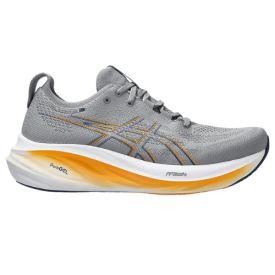
As an upgraded silhouette to the Gel-Cumulus lineup, the Gel-Nimbus 26 from Asics delivers a hefty helping of FF BLAST PLUS ECO midsole foam that can feel great underfoot for long-distance workouts. Additionally, the PureGEL technology that’s become synonymous with the brand is still retained in the heel, adding a beneficial sense of shock absorption to make foot strikes all the more welcoming.
Specs
- Price: $160
- Footwear Style: Traditional running shoes
- Weight: 10.8oz
- Upper Material: Engineered knit
- Available Colorways: 12
- Available Sizes: 6-16
Pros
- FF BLAST PLUS ECO midsole is excellent for longer, more relaxed mileage
- PureGEL cushioning in the heel for better shock absorption
- Updated rubber outsole for increased traction and balance
Cons
- Engineered knit upper can run hot at times
- Some athletes may prefer a lighter shoe for recovery days
- Midsole is more structured and rigid than previous iterations
If you’re more from the camp of active recovery, a leisurely run with plenty of shock absorption and underfoot comfort can be prime for your non-training scenarios. The Gel-Nimbus 26s from Asics are a go-to in our rotations for extended mileage thanks to the plush FF BLAST PLUS ECO foam across the midsole that delivers a cozy ride with enough bounce to make every transition as effortless as the last.
Admittedly, my mileage is still low with these best running shoes, although the Gel-Nimbus 25s — the predecessor to this current iteration — were a mainstay in my training protocol until the latest silhouette hit the streets. Judging from the spec sheets and limited trial runs I’ve had, I can say that they’re virtually the same sneaker with a few minor upgrades.
The one area where I feel Asics upgraded for the better is within the outsole. The new HYBRID ASICSGRIP outsole does promote better grip on asphalt and pavement — an issue I previously had with older Gel-Nimbus iterations, particularly after a harsh rainstorm.
I rated the outsole at 4 out of 5, because I do feel like I have more confidence underfoot, which is always a plus when you’re just trying to get out and stay active without really pushing your limits. Additionally, the outsole is one of the factors that led us to rank the Gel-Nimbus 26s as one of our favorite shoes for treadmill running.
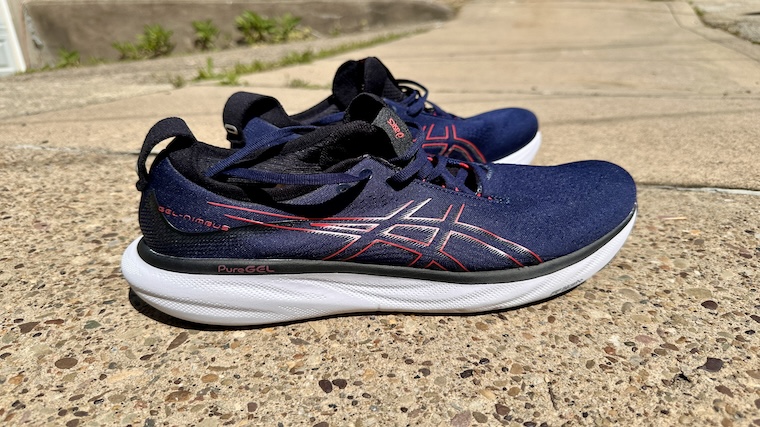
However, I do want to note that the upgraded outsole did add some weight to the profile. Some athletes may prefer a lighter sneaker when taking it easy is the name of the game from start to finish.
I also rated the cushioning at a 5 out of 5. The midsole foam provides a good sense of comfort without feeling too plush that it pancakes outward with each landing. Also, I like how Asics has kept the PureGEL technology in the heel design, which I’ve found makes for a more comfortable heel strike that isn’t too jarring.
Lastly, the engineered knit upper cloaks your foot comfortably, but it may be best to pay attention to your weather forecasts. I’ve found that this textile can run hot at times, leading to some excessive perspiration.
Best Recovery Sandal: OOFOS OOahh Slide Sandal
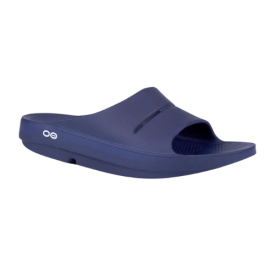
OOFOS, as a brand, has been a pioneer in the “recovery shoe” category, with the OOahh Slide Sandal being one of its flagship silhouettes. Unlike other flip-flops, this profile features a contoured footbed that can provide ample arch support for tired feet post-training, and the open-toed design helps ensure that breathability is never in question during your cooldown sessions.
Specs
- Price: $59.95
- Footwear Style: Flip-flop
- Weight: 11oz
- Upper Material: OOfoam
- Available Colorways: 5
- Available Sizes: 3-14
Pros
- Open-toed design helps promote breathability
- Contoured footbed adds arch support better than other flats
- Machine washable for more convenient upkeep
Cons
- Outsole not suitable for slippery terrain
- Midfoot strap is not adjustable
- Narrow profile is not ideal for wider-footed athletes
If you’re an athlete that prefers to slip into a pair of slides post-training, the OOFOS OOahh Slide Sandals can be a great addition to your after-workout get-up. Not only can the open-toed design promote better breathability for cooling off after hitting your fitness goals, but the anatomical midfoot design can deliver a unique sense of arch support not commonly found in flip-flops.
Having worn these OOFOS slides in the past, I can attest to their heightened support underfoot. While I don’t suffer from flat arches, I still felt like these recovery shoes cradled my foot well enough for a comfortable stride post training.
Additionally, I rated the support at 4 out of 5, as I felt balanced enough during my steps that there were no issues in terms of rolling over the sidewalls — let’s face it, your post-workout steps aren’t the most form-correct strides you’ll ever take.
The fit of the OOFOS OOahh Slides does feel snug, which was a great perk for my narrower feet. However, I scored the overall fit at 4 out of 5 given the lack of wide sizing. Athletes with larger feet may feel too constricted in these flip-flops — a burden that shouldn’t be present in footwear designed to bolster your recovery sessions.
Keeping these flip-flops clean in-between wears can also be a breeze thanks to the molded OOfoam makeup of the entire silhouette. According to the brand, this material is machine washable, so you can easily throw these kicks into a cycle and air dry them for a fresh look. While I’ve yet to go through such a cleaning procedure, I do like how OOFOS keeps footwear maintenance simplified. As such, I rated the design at 4.5 out of 5.
Of course, these slides aren’t compatible with add-on insoles, nor are they a recommended footwear option for more active endeavors like running or HIIT training. However, if you’re just looking for a simple pair of recovery slides, the OOFAS OOahhs should definitely be on your shortlist.
Best Recovery Shoes for Plantar Fasciitis: Vionic Rejuvenate Recovery Sandal
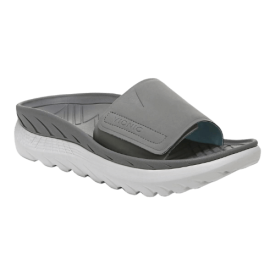
With a more rigid midsole design that cradles your foot through every transition, the Vionic Rejuvenate Recovery Sandals can be a solid addition to your gym bag if you’re dealing with noticeable foot pain post-training. Additionally, the midfoot strap features a hook-and-loop patch, giving you room to tighten or loosen your fit for that just-right feeling.
Specs
- Price: $85
- Footwear Style: Slip-on sandal
- Weight: 9oz
- Upper Material: Hook-and-loop
- Available Colorways: 14
- Available Sizes: 5-12.5
Pros
- Added structure across the midfoot helps lessen strain across plantar fascia
- Design is approved by the American Podiatric Medical Association
- Hook-and-loop midfoot strap can be adjusted for better lockdown
Cons
- Some athletes may prefer a more pronounced style
- More structured midfoot may feel uncomfortable for some
- Hook-and-loop fastening can come undone easily
For those working out or running everyday yet dealing with pesky conditions like plantar fasciitis, every step (whether in training or not) can be a chore in itself. To help ease the strain across your midfoot, it can be ideal to look for shoes with ample arch support to support your transitions from heel strike to toe-off such as Vionic Rejuvenate Recovery Sandal.
We like this recovery-minded silhouette for those dealing with plantar fasciitis thanks to the more pronounced arch support across the footbed, which can give each stride a better sense of rigidity and stabilization that’s key when trying to nurse through this debilitating injury. We rated the overall support at 4.5 out of 5, too, given the wider base that can help ensure balance as you walk through your post-workout activities.
[Related: How Many Miles Should I Run a Day? Insights From a CPT]
In addition to the arch support, I also appreciate the hook-and-loop design across the midfoot, which I rated at 4 out of 5 for adjustability. This can be great for finding that ideal lockdown, although some customers have noted that the Velcro used across this area lacks a certain grippiness. “The single strap would not hold the shoe in place,” noted one displeased individual.
Let’s talk style: While the brand does offer these slides in an array of colorways, the overall look can be somewhat depressing, especially when other recovery shoes are offered in more vibrant hues and eye-catching patterns. I wouldn’t personally wear these outside of post-training situations or around the house. As such, I scored the style at 3.5 out of 5.
Of course, the extra support underfoot may not be necessary for every athlete out there. In fact, those not dealing with plantar fasciitis may actually find the added structure to be somewhat uncomfortable. However, if we’re looking for a supportive shoe that can help ensure a more comfortable experience, we still recommend the Vionic Rejuvenates — they’re even backed by the American Podiatric Medical Association.
Most Comfortable Recovery Shoes: Topo Athletic Revive
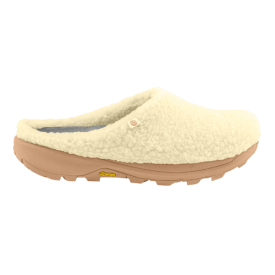
Resembling more of a soft and furry clog than a recovery shoe, the Topo Athletic Revives are constructed with recycled polyester fleece across the upper for a warm, inviting sensation in every step. The Vibram XS Trek EVO outsole gives this clog some bite, too, with a rugged tread pattern that will have you questioning how far you’re willing to travel in these comfy kicks.
Specs
- Price: $120
- Footwear Style: Slip-on clog
- Weight: 7.8oz
- Upper Material: Recycled polyester fleece
- Available Colorways: 3
- Available Sizes: 8-13
Pros
- Polyester fleece upper creates a soft, soothing fit
- Vibram outsole gives every step premium traction and grip
- Massaging 3D Wave Sense Insole offers a gentle touch for added comfort
Cons
- Clog style eliminates ankle support
- Limited colorways available across the profile
- Fuzzier fleece can become dirtied quickly, per our tester
Of course, comfort is the name of the game in recovery shoes. For a rejuvenating sense of coziness, we recommend the Revive Clog from Topo Athletic. This slip-on clog uses recycled polyester fleece for its upper design, essentially creating a cloak across your feet that’s akin to your favorite blanket. Don’t let the soft touch fool you, though — these clogs also house an impressive Vibram outsole that’s more than ready to tackle terrain beyond your living room.
Our tester, an avid climbing athlete, rated the traction of these slippers at 5 out of 5, saying, “The Vibram XS Trek EVO outsole makes these Revives a perfect fit for a variety of activities. My only qualm with wearing them outside more is that I don’t want to get the fleece upper dirty.”
While the comfort is definitely there across this recovery clog — bolstered by an Ortholite 3D Wave Sense footbed that gives each step a massaging effect across your feet that can be more appealing than, say, a session with one of the best foam rollers — we are hesitant to take these Topo Athletic kicks for further treks.
Yes, we rated the comfort at 5 out of 5, but the upkeep of the fleece practically squashes the urge to wear these excessively. We scored the construction at 4 out of 5 as keeping the upper clean can be a challenge in itself, especially if you opt for the all-white colorway.
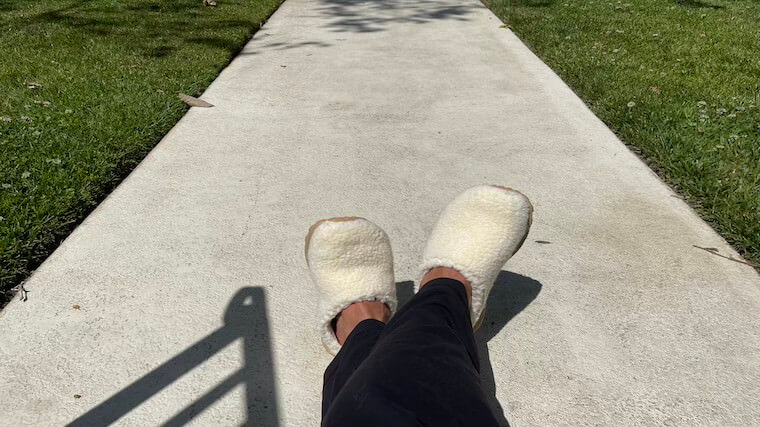
I’d also point out that while the clog style can be convenient when transitioning from your training program to a more relaxed recovery state, it may not be the best for active recovery days. There is no ankle support to help add stability to each stride, so it’s not the most secure footwear pick for more active endeavors. You could use these as walking shoes, but I’d keep the distances very short — about the length of your block or driveway.
Lastly, our tester had no issues with a cramped footbed or narrow midfoot. However, they do recommend paying close attention to the size guide. “I’d suggest opting for half a size bigger than your day-to-day sneakers for a comfortable, roomy interior,” they stated.
Benefits of Recovery Shoes
BarBend expert reviewer Amanda Capritto, CPT, CES, CNC, CF-L1, CSNC, notes that having a dedicated pair of shoes for each fitness discipline is a great way to ensure your feet are supported properly throughout your training journey, with recovery endeavors being no exception. From increasing comfort post-workout for a proper cooldown to serving as a mental cue that it’s time to rest, below are some of the benefits that can come from adding recovery shoes to your footwear rotation.
- Increased Post-Workout Comfort: Your feet can’t really begin to recover from a workout if you’re still uncomfortable in your kicks. Recovery shoes can help kickstart the recovery process by giving your feet a break from the more rigid footbeds of training shoes via well-cushioned, bouncy designs that cradle and coddle your heel, arches, and forefoot through your strides after training.
- Improved Circulation: Some recovery shoes feature raised nodes or massaging textures across the footbed, which can help promote better circulation across your footprint. Studies report that improved blood flow can be a catalyst for proper recovery, so these features can be excellent for giving your rest between sessions an extra boost. (1)
- Mental Cue to Slow Down: Slipping into your recovery shoes can also be a good indicator to your body that it’s time to rest and recuperate. Having this cue within your regimen can help you grow the routine of cooling down post-workout rather than staying active or filling those segments of your day with other taxing endeavors.
How Much Do Recovery Shoes Cost?
Given the newness of the “recovery shoe” category, the true definition is still somewhat defined, meaning finding price points can be a bit of a pain. From our experience and expertise, though, we’ve found that you can find a high-quality pair of recovery shoes for roughly $90 with obvious fluctuations both below and above this median cost. Read below to compare the prices of recovery shoes featured in this round-up.
| Best Recovery Shoes Overall | Kane Revive Active Recovery Shoes | Starting at $75 |
| Best Budget Recovery Shoes | Adidas Adissage Slides | $32 |
| Most Versatile Recovery Shoes | Under Armour UA SlipSpeed | $120 |
| Best Recovery Shoes for Around the House | Teva ReEMBER | $80 |
| Best Slip-On Recovery Shoes | HOKA Ora Recovery Shoe 2 | $90 |
| Best Shoes for Recovery Runs | Asics Gel-Nimbus 26 | $160 |
| Best Recovery Sandal | OOFOS OOahh Slide Sandal | $59.95 |
| Best Recovery Shoes for Plantar Fasciitis | Vionic Rejuvenate Recovery Sandal | $85 |
| Most Comfortable Recovery Shoes | Topo Athletic Revive | $120 |
What to Consider Before Buying Recovery Shoes
As with any piece of running gear or training apparel, you’ll need to think through a few factors before reaping the comfortable perks of recovery shoes. Below are a few components we recommend considering before finalizing your cart as you take a further step into dedicated recovery.
Midsole Cushioning
When looking to start your muscle recovery from the ground up, you’ll want to ensure that your recovery shoes are constructed with a comfy midsole that’s plush enough for your post-training strides. Be sure to look at the midsole design to determine whether the integrated features are designed for cushioning or responsiveness. We recommend opting for a silhouette featuring a plush footbed that still retains some structure during landings.
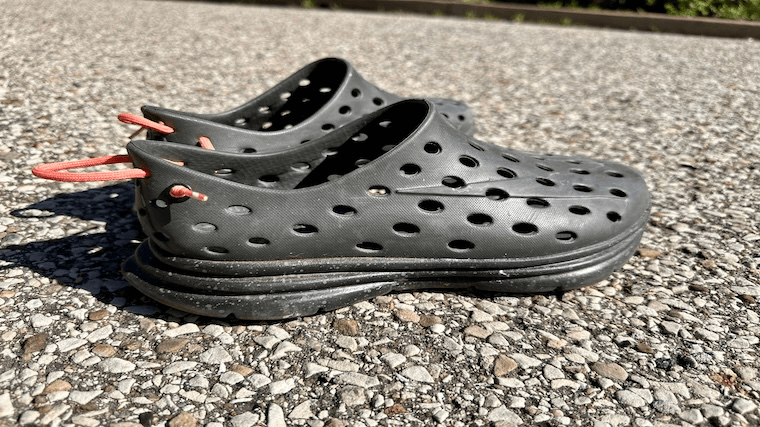
Additionally, some recovery shoes will feature a thinner midsole composition, which you’ll mostly see in slipper-style shoes or flip-flops. While these can still be worthwhile profiles for your recovery needs, they may be better reserved for wear around the house where you don’t need to be on your feet as much.
Arch Support
In addition to the general comfort of your recovery shoes, it can also be wise to opt for a profile that showcases some sense of arch support. As you grow tired after your workout, your feet can have a tendency to land flat, which can lead to discomfort. Having a stable footbed that features enough rigidity in key areas can help you maintain a proper stepping pattern even after your dedication to proper form has left your train of thought.
Some recovery shoes will account for this arch support through contoured footbeds that give you constant contact with the shoe itself, while others may employ differing foams at the midfoot for better support. There is no right or wrong answer, so look for a silhouette that seems appealing to your unique footprint.
[Related: Why Do My Shins Hurt When I Run?]
Ease of Entry
Odds are that after training and expending all your energy, you’ll want to keep your footwear as convenient as possible. Having a pair of recovery shoes that can be easily slid on or slipped into can help you transition quickly into that cool-down mindset while also eliminating the need to fuss with laces that, let’s face it, can be a pain at any time of day.
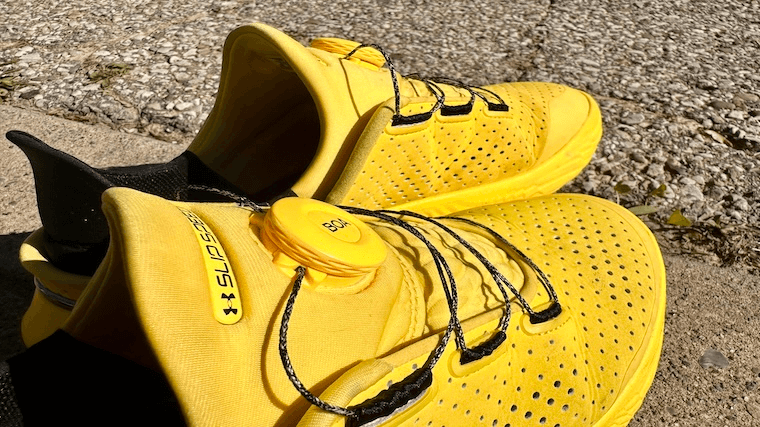
There are plenty of recovery-minded profiles featuring a slip-on design, including closed-toed and open-toed profiles, so think through your personal preferences and choose a pair that matches your style best.
Fit
Like any pair of shoes in your rotation, you’ll want your recovery shoes to fit properly without excessive room or constricting hot spots. When looking for your ideal fit, be sure to pay close attention to the brand’s proprietary size guide, as this can help you determine whether you’ll need to size up or down. As always, make sure to opt for the sizing that suits your personal measurements best.
Price
Given the newness of the recovery shoe category, it can be tough to determine what constitutes a fair deal in terms of pricing. On average, though, we’ve found that most high-quality recovery shoes will cost roughly $90, with natural fluctuations from brand to brand. As such, the best recovery shoe for your needs is the one that comfortably fits within your budget. Take a look at your finances and try to find a profile that matches what you can afford.
Best Recovery Shoes FAQs
Do recovery shoes really work?
Whether or not your footwear “works” can be subjective, as every athlete has a different interpretation of the term. However, recovery shoes are designed to provide increased comfort and support to your feet after taxing them through training, so if you’re looking for extra cushioning underfoot to help bolster your recovery routines, they could be a worthwhile option.
What is the best recovery shoe?
The recovery shoe category is in its infancy, and every athlete has different needs and wants. For our money, though, we think the Kane Revive Active Recovery Shoes are the best of the bunch thanks to the lightweight and breathable slip-on design, as well as the raised nodes along the footbed that help promote better circulation for improved recovery in-between workouts.
How much do recovery shoes cost?
On average, you can expect to pay roughly $90 for a pair of dedicated recovery shoes. However, the true definition of the category is a little more open-ended than other footwear types, so feel free to browse and find a price tag that suits your needs (and budget) best.
References
- Borne, R., Hausswirth, C., & Bieuzen, F. (2016). Relationship between blood flow and performance recovery: A randomized, placebo-controlled study. International Journal of Sports Physiology and Performance, 12(2), 152–160. https://pubmed.ncbi.nlm.nih.gov/27139812/